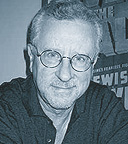 |
|
Biography
For more than 45 years, Blumenthal led an extensive and illustrious career at the Times as an arts and culture news reporter (1994-2003), an investigative and crime reporter (1971-1994), a foreign correspondent (Germany, Vietnam, Cambodia, 1968-1971) metro and Westchester correspondent (1964-1968) and a reporter/columnist for The Grand Prairie Daily News Texan in 1963. Blumenthal earned a Guggenheim Fellowship (April 2001), the prestigious Columbia University Graduate School of Journalism Alumni Award (2001), and the Worth Bingham Prize for distinguished investigative reporting, 1994. The Worth Bingham Prize honors newspaper or magazine investigative reporting of stories of national significance where the public interest is being ill-served. He was inducted into the C.C.N.Y. Communications Alumni Hall of Fame in May 2010. He taught journalism in the summer school of Phillips Exeter Academy in Exeter, N.H., and is joining the faculty of the Baruch College of the City University of New York to teach journalism. Career Narrative:Having edited my college newspaper, The City College Campus, and gone on to the Columbia University Graduate School of Journalism, I joined The New York Times as a news clerk in June 1964. Within months I was promoted to the metro staff. In 1968 I was named a foreign correspondent -- at 26, the youngest in many years -- in the Bonn Bureau where I covered the Soviet invasion of Czechoslovakia, the rise of neo-Nazism and the West German economic miracle. The following year the Times sent me to Saigon to cover the war and what became the spread of fighting to Cambodia. Assigned back to New York in 1971, I became an investigative reporter specializing in stories about foreign and American corruption and organized crime. My series on Nazi war criminals hiding in America helped pass a Congressional bill to bar persecutors from entering the country, the Holtzman Amendment. I was the American reporter who first got the tip on Kurt Waldheim's secret Nazi past. Another series, on corrupt dealings and cocaine use by Brooklyn Representative Fred Richmond, led to the Congressman's guilty plea and resignation from the House. My articles on questionable financial dealings by the 1984 Democratic Vice Presidential nominee, Geraldine Ferraro, and her husband, John Zaccaro, became a factor in the election. In 1987 I led the Times team that exposed the Tawana Brawley racial hoax and produced the series (and later a book, Outrage) nominated for the Pulitzer Prize. In 1988, Last Days of the Sicilians, my first book, on the FBI's Pizza Connection drug case was published, and I was invited to the annual retreat of the judges of the United States Court of Appeals for the Second Circuit to speak on electronic eavesdropping. In 1993, I led the team covering the World Trade Center bombing, which won the paper a Pulitzer Prize for spot reporting. The following year, I co-authored another series on the fatal crashes of USAir. It prompted new safety procedures, was nominated for a Pulitzer and won the Worth Bingham prize for investigative reporting, presented by President Clinton at the White House Correspondent's dinner. It was also a finalist for Harvard University's Goldsmith's Prize. In 1994, looking for a change of pace, I joined the culture news department as an arts reporter, where I shared, with co-writers, a Times Publisher's Award for a series on the Sotheby's and Christie's antitrust scandal -- one of some two dozen of such Times awards made to me over the years. After Sept. 11, 2001, I briefly rejoined the investigative team covering terrorism. Meanwhile, I wrote two other non-fiction books: Once Through the Heart, on a police narcotics detective's struggle to rescue his own daughter from drugs, and Stork Club, a history of the Stork Club, its renegade owner and the nightclub and gangster era in Gotham. The book became the focus of an exhibit, "Stork Club," at the New York Historical Society, which I curated and which ran from May-Oct., 2000. My fifth book, Miracle at Sing Sing, for which I received the Guggenheim grant, was published in June, 2004. In 2003, I went to Texas to cover the Southwest where I investigated death penalty cases, President George W. Bush’s military record, and the polygamist cult. Upon my return to the Metro staff in 2008, I wrote news features and blogged on city issues. My proudest achievements, I must say, however, are none of these. They are Anna, a graduate of the University of Delaware and rock guitarist of her band, the Anabolics; and her sister, Sophie, now also a UDel student, for whom I gratefully share credit with my wife, Deborah, a nutritionist and fellow writer and journalist. |
|
| Copyright Ralph Blumenthal 2004. All Rights Reserved. Site Design by Allison Hunter Web Design, LLC |
|
 Ralph Blumenthal was a reporter for
Ralph Blumenthal was a reporter for